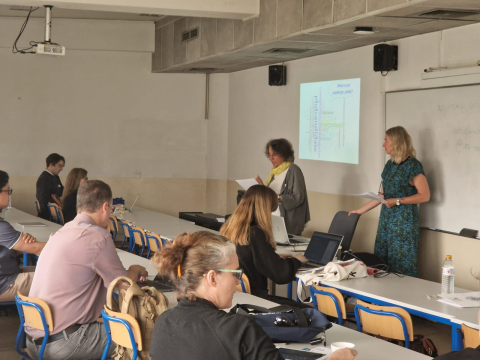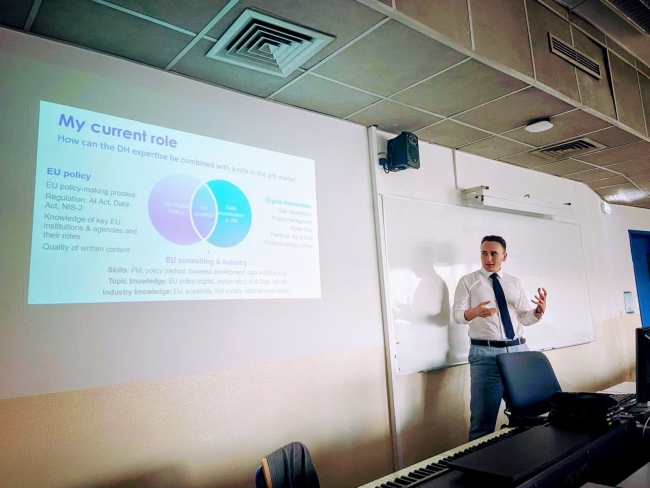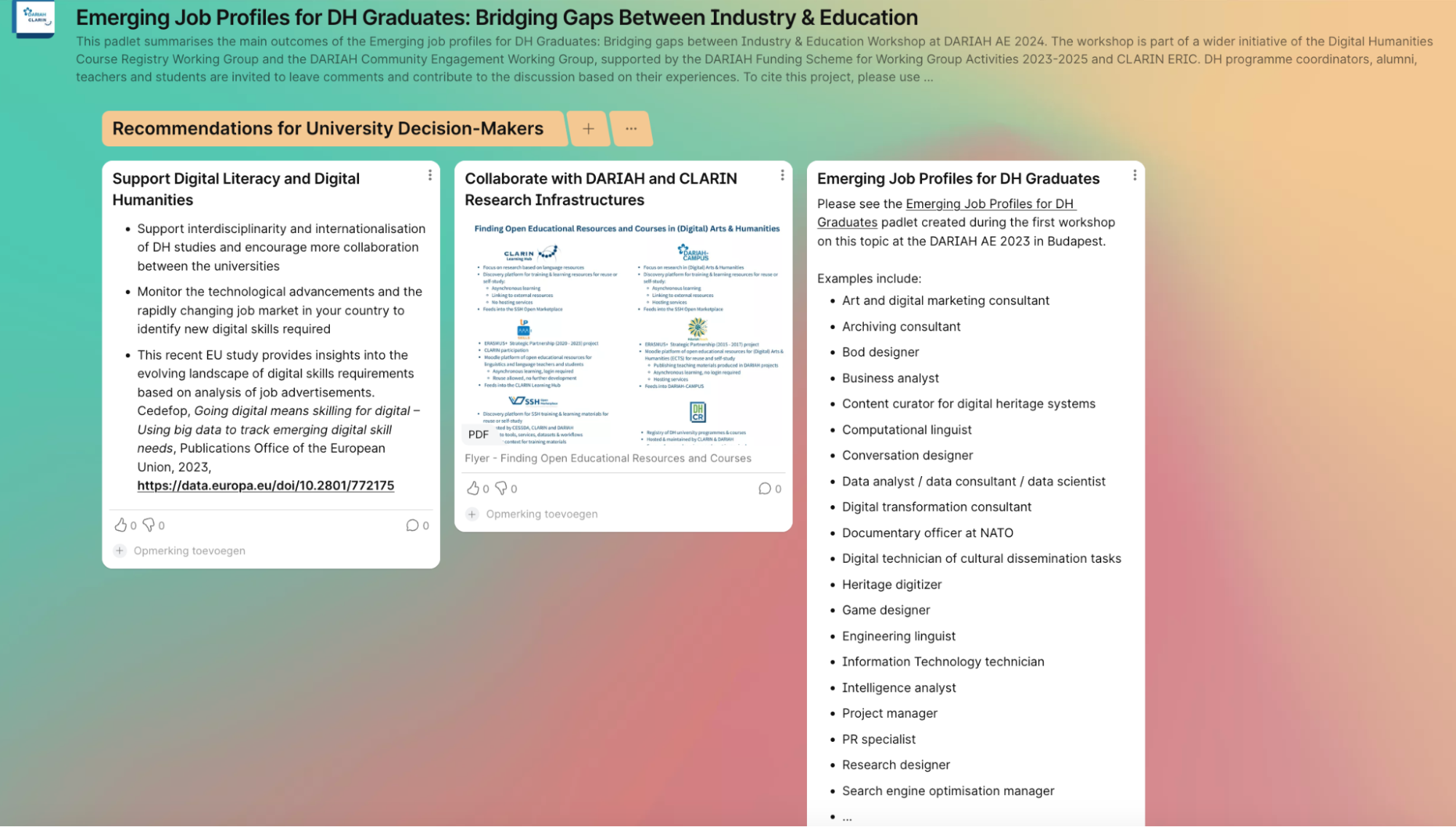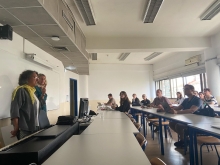Insights from the DARIAH Annual Event workshop
Written by Amelia Sanz & Maria Goicoechea de Jorge (Universidad Complutense de Madrid). Iulianna van der Lek (CLARIN ERIC), Tom Gheldof (CLARIAH-VL)
On 18 June, 2024, at the DARIAH Annual Event in Lisbon, a workshop titled ‘Emerging Job Profiles for DH Graduates: Bridging Gaps Between Industry & Education’ was organised by Amelia Sanz, Maria Goicoechea de Jorge (Universidad Complutense de Madrid), Iulianna van der Lek (CLARIN ), and Tom Gheldof (CLARIAH-VL).

This workshop, a significant part of an ongoing study initiated by Amelia Sanz and Maria Goicoechea de Jorge in 2023 in collaboration with the Digital Humanities Course Registry Working Group & the DARIAH Community Engagement Working Group. Funded by the DARIAH Funding Scheme for Working Group Activities 2023-2025, this study explores the strategies Digital Humanities (DH) programmes in Europe employ to prepare graduates for careers in academia, the public sector, and industry. The study has yielded valuable insights and recommendations through a multifaceted approach, including focused interviews, questionnaires with DH programme coordinators and their alumni, as well as two workshops.
While the first workshop, organised at the DARIAH Annual Event 2023 in Budapest, focused on identifying good practices across DH programs in Europe to foster collaboration with the non-academic sectors and create employability opportunities for their graduates, this year’s workshop featured inspiring lightning talks from six invited DH alumni from Belgium, Portugal, Spain, Sweden, and the UK.
Interviewing DH Alumni: Preliminary Insights
The workshop was kicked off by Amelia Sanz and Maria Goicoechea from the University of Madrid, who presented the initiative and the preliminary insights from the interviews and questionnaires with 50 DH alumni. The aim of the interviews was to gather information about the alumni’s career paths and use their insights to improve the current programmes. Most alumni secured a job either during their internships or within three months of graduating. The job profiles ranged from communication officer, librarian and PhD candidate, to computational linguist, research engineer, qualitative research manager, and conversation designer. Overall, the alumni acknowledged that the skills acquired during their DH studies proved valuable in their current roles. However, the interviews revealed that some subjects were not seen as useful, such as copyright and ethical issues, academic writing, databases, stylometrics, AI, and automatic transcription. Further analysis of the interview data is necessary in order to understand why. Additionally, the alumni wished their studies had put more emphasis on practical skills, such as Python programming, machine learning, deep learning, and hands-on projects using applications, database management and web scraping. They also felt that soft skills, such as teamwork, communication and presentation skills, task organisation and time management, had often been overlooked during their studies.
Alumni Lightning Talks: Leveraging DH Skills in the Job Market
The alumni lightning talks provided a platform for the six alumni to share information about their current and past job experiences, and to reflect on the value of the skills gained during their DH studies.
Aitana Garcia de La Higuera is currently completing her MA in Digital Letters at the Complutense University of Madrid and collaborated as an intern on this project, surveying 73 DH programs in Europe (based on the data in the DH course registry) and 120 in North America. Through interviews with DH alumni, she found that most preferred to work in the industry rather than pursue a research career. In her presentation, she highlighted the potential for hybrid job roles for DH alumni, given their combined backgrounds in humanities and computer science. She emphasised that DH graduates should not compete with computer engineers, but instead leverage their unique skill set to act as intermediaries between the two fields.
Christa Shusko studied traditional humanities in the USA and then pursued a Master's in Digital Humanities at Linnaeus University in Sweden. She has recently completed her degree and is currently seeking employment. Transitioning to the Swedish job market required her to learn new methods, tools, and skills, sparking her interest in cultural heritage. She recommends digital humanities programmes as they provide a good balance between traditional humanities and digital skills, helping students articulate and demonstrate their strengths through career counselling and internship opportunities.

After completing an MSc in Digital Humanities at Leuven University, Evangelos Palaskas pursued a PhD focusing on the EU's Digital Transition and its impact on Artificial Intelligence (AI) regulation. Following his studies, he gained diverse professional experience as an application manager at KU Leuven and a data visualisation consultant at Deloitte. Currently, he holds a position as a senior EU consultant at BearingPoint. Throughout his career, he has continued to enhance his digital humanities skills, including project management and creating data visualisations using Tableau. Evangelos encourages students and graduates in the digital humanities field to leverage their multidisciplinary background against market needs, develop a proactive problem-solving mindset and apply their DH skills to generate valuable insights for their customers through data visualisation stories.
Francisco Lopes da Cunha, from Portugal, completed an MA in DH at the University of Minho, after which he found a job as a scrum master at a Digital Publishing Company. He observed that such roles are in demand and suitable for DH graduates because they can leverage their transferable skills. He recommends DH programme coordinators to promote problem-based learning (PBL), favouring holistic, end-to-end projects and solution-building over learning isolated skills, while fostering AI literacy and entrepreneurship.
Jan Salazar from Spain graduated from the MA in DH programme at the University of Barcelona and is currently working as a freelance digital humanist and research support technician in the digital reconstruction of architectural heritage at the University of Barcelona. During his presentation, Jan shared his experience applying 3D digitisation skills to cultural heritage projects. He encouraged DH graduates to explore the job market not only as employees, but also as freelancers and entrepreneurs, as this is a growing market, especially in big cities with an attractive tourism model and great cultural interest.
Maxi Gorynski completed his MA in Arts and Digital Humanities at King’s College in London, after which he worked in digital content marketing for about two years. He is currently the CEO of Surf and a product owner at DT Consulting. He found his training in interdisciplinary perspectives, basic Python skills, data analysis and modelling and asset management skills particularly useful in the digital product development market. He recommends DH programmes to incorporate more engineering training and foster entrepreneurship through dedicated product development courses, teaching students how to set up their own companies and embrace their full potential.
Complementary Insights and Recommendations from the Policy Level
The insights shared by the alumni were complemented and confirmed by the presentation of Jorge Franganillo, Coordinator MA in Digital Content Management, at the University of Barcelona. Jorge conducted a small-scale study about the key competencies and employability skills in Digital Content Management. Through a career guidance session and an online survey, Jorge collected the views of 10 graduates on the relevance of specific soft and hard skills required in Digital Content Management. The findings reveal that AI skills are becoming essential, as AI is often used for content creation and data analysis.
The workshop highlighted the value of DH skills in industry roles, such as project management, business development, data analytics & AI. The discussions and presentations resulted in the creation of initial recommendations for digital humanities (DH) programmes, university decision-makers, students and graduates, potential employers, and research infrastructures. These recommendations are all summarised in this Padlet. We invite contributions on the topic of DH and employability using the commenting feature.

The working groups are expected to finalise this explorative study in a white paper at the end of the project in June 2025 and further disseminate it through knowledge-sharing channels and other events.
Acknowledgements

This initiative is supported by the DARIAH Funding Scheme for Working Group Activities 2023-2025 and CLARIN ERIC.
We would like to thank the DH alumni who accepted our invitation to take part in the workshop and share their experience: Christa Shusko, Evangelos Palaskas, Aitana Garcia de La Higuera, Francisco Lopes da Cunha, Jan Salazar, Maxi Gorynski.